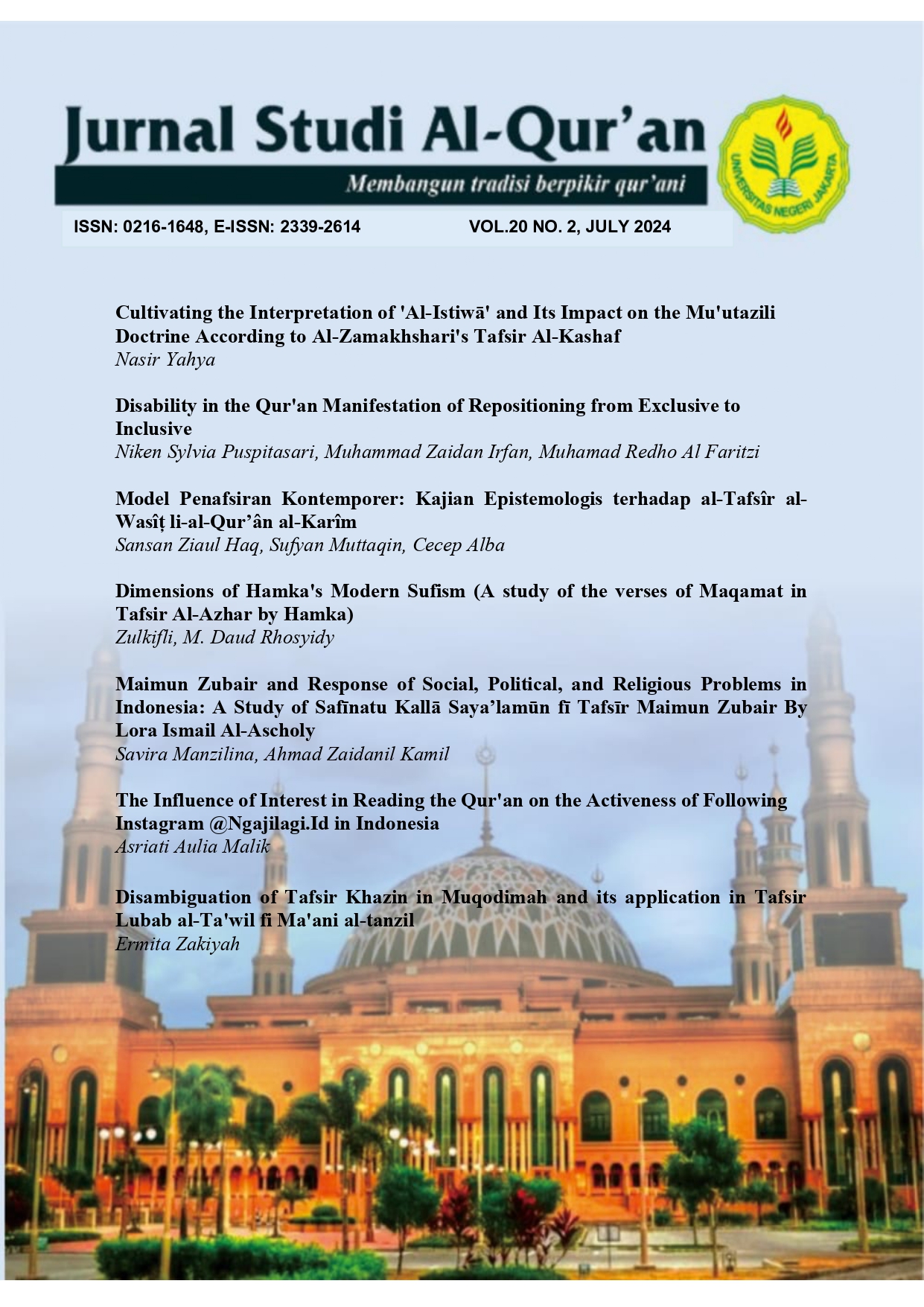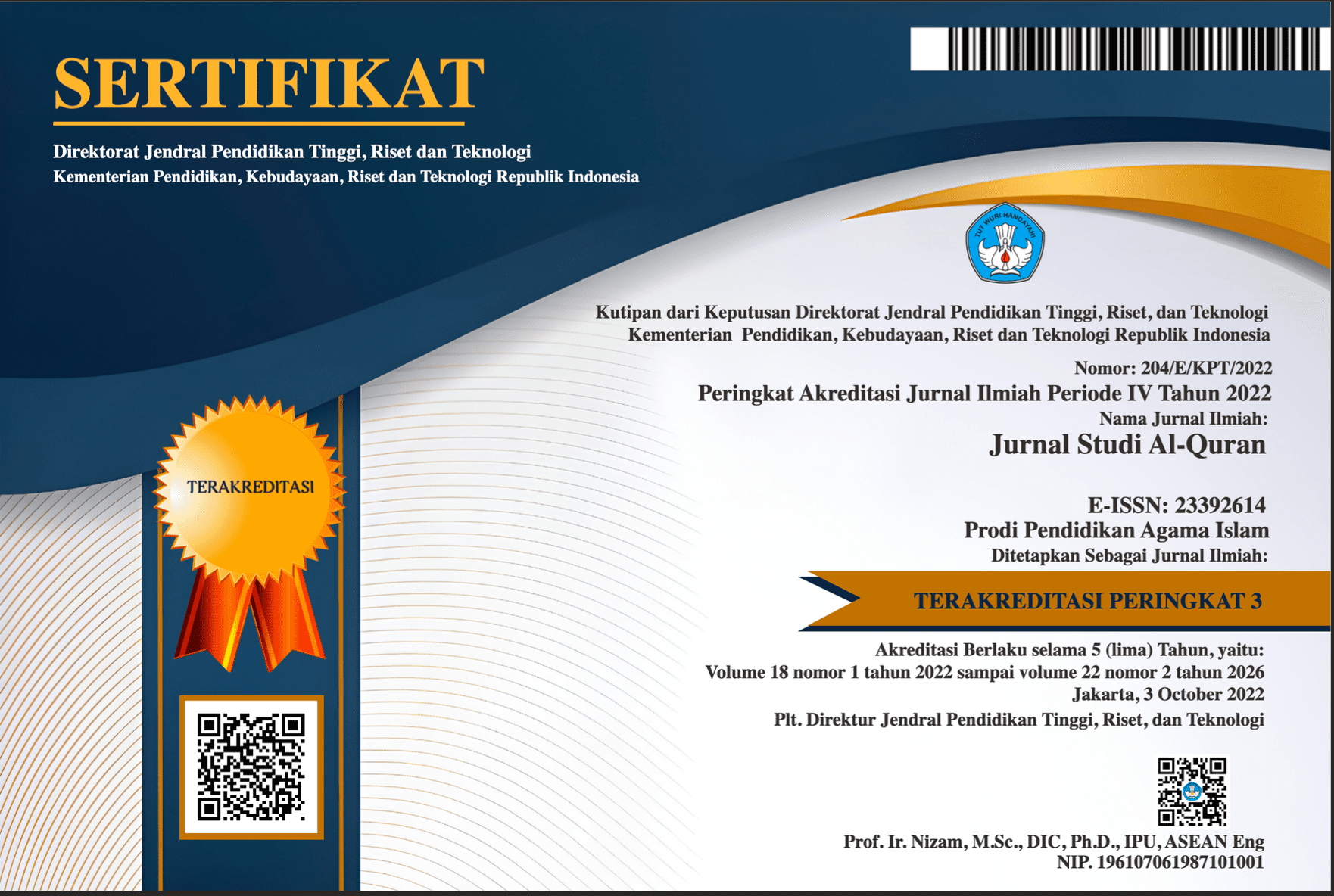Cultivating the Linguistic Interpretation of 'Al-Istiwā' and its Impact on the Mu'utazili Doctrine According to Al-Zamakhshari's Tafsir Al-Kashaf
DOI:
https://doi.org/10.21009/JSQ.20.2.01Keywords:
Zamakhshari, Alkashaf, Mu'tazila, IstiwaAbstract
Islamic thought has produced many intellectual and scientific schools, within which many personalities in different scientific fields have emerged. Al-Zamakhshari (d. 538H) is regarded as one of the most influential figures from the Mu’tazila school of thought in the history of Arab and Islamic culture. This study aims to reveal the direction and impact of Mu'tazila thought on the interpretation of verses related to Istiwa through Zamakhshari's book "Al-Kashaf" to expand the definition of the linguistic meanings presented by Al-Zamakhshari and analyze the contexts in which he dealt with this concept. The significance of this article lies in understanding the mechanisms of interpretation upon which Al-Zamakhshari relied in defending his belief by using reasoning and language to disassociate and free the Almighty from being similar or resembling the creature. The research used the descriptive-analytical approach to highlight the aspects used in al-Zamakhshari's interpretation of the concept of Istiwa. The study finds that the interpretations of the verses related to al-Istiwa Zamakhshari are purely linguistic-based interpretations, which he employs and links to the significance and context meaning according to what supports his Mu’tazili doctrine.
References
- معجم البلدان - شهاب الدين أبو عبد الله ياقوت بن عبد الله الرومي الحموي (ت ٦٢٦هـ)، ط 2، 1995م، دار صادر، بيروت- لبنان.
- طبقات المفسرين للداوودي - محمد بن علي بن أحمد، شمس الدين الداوودي المالكي (ت ٩٤٥هـ)، دار الكتب العلمية بيروت- لبنان.
- معجم مقاييس اللغة، أحمد بن فارس بن زكرياء القزويني الرازي، أبو الحسين (ت ٣٩٥هـ)، دار الفكر، 1979م
- بصائر ذوي التمييز في لطائف الكتاب العزيز ،- لفيروز أبادي، ج1، المجلس الأعلى للشؤون الإسلامية، (د ت).
- أساس البلاغة - أبو القاسم الزمخشري، تح محمد باسل عيون السود، ج1و2، لبنان، بيروت، دار الكتب العلمية، 1998م، ط1
- صحيح البخاري ، أبو عبد الله محمد بن إسماعيل البخاري الجعفي، ط 5, 1993م، دار ابن كثير، دار اليمامة – دمشق.
-نزهة الأعين النواظر في علم الوجوه والنظائر - جمال الدين أبو الفرج عبد الرحمن بن علي بن محمد الجوزي (ت ٥٩٧هـ)، ط 1، 1984م، مؤسسة الرسالة - لبنان/ بيروت
- قَانون التَّأويْل، القاضي محمد بن عبد الله أبو بكر بن العربي المعافري الاشبيلي المالكي (ت ٥٤٣هـ)، ط 1، 1986م، دار القبلة للثقافة الإسلاميَّة، جَدّة، مؤسَسَة عُلوم القرآن، بيروت
- رسالتان فريدتان ، أبو القاسم محمود بن عمرو بن أحمد، الزمخشري جار الله (ت ٥٣٨هـ)، القيروان للنشر والتوزيع
- كشاف الزمخشري عقيدة ومنهجا، د. إبراهيم مناد: ، جامعة مستغانم،العدد السادس عشر 2016، ص 107- 125.
- مختار الصحاح، زين الدين أبو عبد الله محمد بن أبي بكر بن عبد القادر الحنفي الرازي (ت ٦٦٦هـ)، المكتبة العصرية - الدار النموذجية، بيروت - صيدا، ١٩٩٩م، ط ٥.
- لسان العرب، محمد بن مكرم بن على، أبو الفضل، جمال الدين ابن منظور الأنصاري الرويفعى الإفريقى (ت ٧١١هـ)، دار صادر - بيروت، ١٤١٤هـ ، ط ٣
- الكشاف للزمخشري تـ (538ه) أهميته و أثره في التراث والتأليف النحوي، محمد طه محمود, & أ. د. إبراهيم رحمن حميد. (2023).. مجلة ديالى للبحوث الانسانية, 4(95), 219-230.
- مبادئ الفكر الاعتزالي في تفسير الكشّاف للزمخشري _مبدأ العدل أنموذجا، صبرينة ماضي, & كمال قادري. (2021)..
- دلالة الأثر الكلامي في فن الترشيح-كشاف الزمخشري نموذجًا، محمد, ف. م. ا., & فاطمة محمود السيد. (2023). مجلة الآداب والعلوم الإنسانية, 96(1), 225-274.
- أثر الفكر الإعتزالي في توجيه الدلالة عند الزمخشري من خلال تفسيره الكشاف، زينية جهاد، مجلة فصل الخطاب، (2021)
Downloads
Published
How to Cite
Issue
Section
License
Authors who publish with this Journal agree to the following terms:
- Author retain copyright and grant the journal right of first publication with the work simultaneously licensed under a creative commons attribution licensethat allow others to share the work within an acknowledgement of the work’s authorship and initial publication of this journal.
- Authors are able to enter into separate, additional contractual arrangementfor the non-exclusive distribution of the journal’s published version of the work (e.g. acknowledgement of its initial publication in this journal).
- Authors are permitted and encouraged to post their work online(e.g. in institutional repositories or on their websites) prior to and during the submission process, as it can lead to productive exchanges, as well as earlier and greater citation of published works.
Users/public use of this website will be licensed to CC BY










